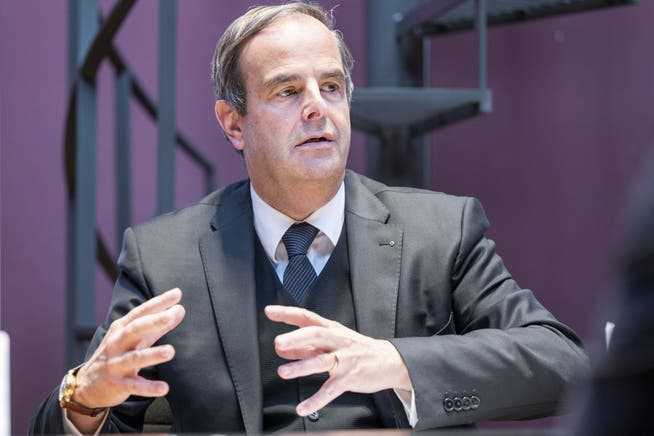FDP and Mitte have been more self-confident since the beginning of the war – now the big neutrality debate with the SVP is waiting.
Thierry Burkart is an officer and president of the FDP.
The FDP and the center are “yes, but” parties. Liberals and conservatives channeled the Sonderbund war into a federal state and henceforth resolved conflicts with compromises instead of cannons. The «yes, but» policy was crucial for the inclusion of the minorities in this country. Today it is often seen as a weakness. The FDP and Mitte were weakened by the pole parties and have the Green Liberals breathing down their necks. Is the turning point also a turnaround for you?
The presidents of the FDP and Mitte have at least recognized the potential momentum of the open world course and have positioned their parties accordingly since the beginning of the war. More security, more sanctions, more solidarity – more votes in the 2023 elections? A Tamedia poll almost a month after Putin’s attack indicates that a majority of the population could imagine permanent military cooperation, at least with the EU. 75 percent of those surveyed support the Federal Council in adopting sanctions against Russia, and the proportion was even larger among supporters of the FDP (79 percent) and the center (86 percent).
Broadside and long throws instead of small-small
In contrast to the SP, the FDP and Mitte were seriously concerned with security policy even before the war, and they have presidents who can credibly convey the new urgency. Thierry Burkart is a captain and presides over the security organization Allianz Sicherheit Schweiz. Close ties to the army were a prerequisite for a political career in the early liberal and conservative world. Since the Cold War, the army and insignia have lost their importance. That has now suddenly changed.
The centre, on the other hand, has a president in Gerhard Pfister whose stature makes the party much bigger than it actually is. Like a father confessor, he has repeatedly taken the ailing Federal Councilor to task over the past few weeks and urged him to finally pull himself together. The officer and the pastor – Burkart and Pfister want to make their parties state-supporting again.

Middle President Gerhard Pfister also takes the Federal Council to task.
It is still unclear whether the new lust for profiling will also bring success. Like all Federal Council parties, the FDP and Mitte have lost seats in the cantonal parliaments in the current legislature. The longing for the old size brings dynamism to the bourgeois camp. At the beginning of March, for example, the Mitte professed Switzerland’s membership of the UN Security Council, but at the same time attacked the foreign department led by Ignazio Cassis. In order for Switzerland to be able to make a successful contribution to the international arena, “more skills are needed in the foreign department,” according to a statement. Even members of the center were surprised by the unusual broadside of their party leadership against the FDP Federal Council. Others were pleased with the new self-confidence.
The FDP has also been more confident since the outbreak of war. Individual words are no longer discussed as in the debate about their position on nuclear power, but rather big leaps. In a highly acclaimed guest article in the NZZ, Thierry Burkart discussed strengthening the strategic partnership between the Swiss army and NATO. In doing so, he regained control of the debate, after Pfister had shortly before suggested integrating the Swiss Air Force into the European defense strategy.
Both presidents argue in the same direction and subliminally fight for the copyright of the idea. He has no trouble with competition, said Pfister in SRF’s “Saturday Review”. Burkart is also relaxed about this. The two lined up to give their parties a profile. And they know very well that it is not consensus that stimulates political business, but competition. And it’s somewhere else anyway.
Praise from Sweden and Finland for the Swiss attitude
The Green Liberals are rushing from one victory to the next in the cantonal parliamentary elections. In the canton of Bern, for example, they have overtaken the center and are now close to the FDP. Not green, but success makes you sexy. On the other side is the SVP. She accuses the two older parties of having given up neutrality and thus part of the original Swiss identity and wanting to get closer to higher-level organizations such as the EU or NATO. Ironically, the SVP gets argumentation aids from abroad.
During a trip to Sweden and Finland last week, the National Council delegation was expressly congratulated by local politicians for the Swiss decision to clearly side with Ukraine and support the sanctions against Putin. The perception abroad that Switzerland has completed a paradigm shift in terms of neutrality policy will further strengthen the SVP in its domestic political course. The FDP and Mitte gave the SVP the cold shoulder when they invited to the round table on energy supply. They will have to face it in the debate about the policy of neutrality. A good opportunity to show that they are no longer “yes, but” parties.
